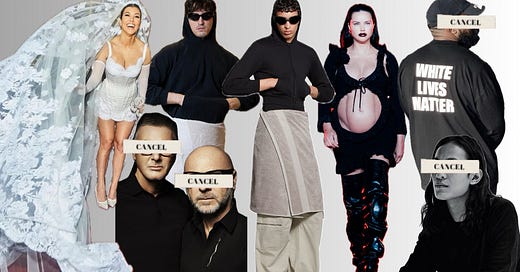Can Fashion Uncancel Itself?
Fashions collective amnesia and cancel culture take over the industry
Cancel culture is here, there, and everywhere. And it's taking over fashion. But brands who were once put on the back burner are managing to uncancel themselves, despite committing many, many fashionable faux paus’.
In fashion, where controversy and creativity often collide, the times when you used to be able to hide behind a glossy façade have long since vanished. The fashion industry is now exposed to the unrelenting gaze of cancel culture, leaving us to wonder: can brands be cancelled once and for all?
On social media, fans and followers are eager to call out scandals big and small, meaning that fashion now finds itself under constant scrutiny. It's a world where missteps are no longer whispered in hushed tones but broadcast across Twitter feeds, Instagram stories and TikTok for you pages, creating a torrent of events that even the most popular brands can't escape.
Take Balenciaga, for instance, a brand that has been in people's bad books for a while now. Two separate campaigns featuring kids in BDSM gear and documents related to a Supreme Court ruling on child pornography sparked outrage. The public response? Literal bonfires of designer wares on TikTok, with the hashtag #CancelBalenciaga trending.
The fashion house, in turn, tried to douse the flames with apologies and legal threats, only to eventually withdraw from the legal battle and slink into a low-profile existence. They fucked up and they knew it.
In an age of instant social media justice and online culture wars, brands and public figures must dance to the tune of public sentiment if they wish to remain relevant. Whether they will or not is another story.
Ye, formerly known as Kanye West, learned this the hard way after his “secret” Yeezy season 9 show at Paris Fashion Week in 2022 featured models in 'White Lives Matter' sweatshirts. Unapologetically abusing former Vogue editor and top stylist Gabriella Karefa-Johnson, Ye's lack of recognition for the mistake and his viral vitriol left a sour taste in peoples mouths.
Meanwhile, Dolce & Gabbana, once drowning in the turbulent waters of controversy, is resurfacing as the go-to designer for the Kardashian-Jenner clan. Kourtney and Travis Barker’s three-part branded wedding was filled with D&G — and it wasn’t so well received. From their Las Vegas nuptials to their Italian ceremony in Portofino, pictures poured in with guests and attendees wearing the non-cancellable brand.
And in a series of Venice runway shows in 2021, stars such as Jennifer Lopez, Doja Cat, Normani and Diddy sat front row at Dolce. Wtf is going on here?
D&G seems to have mastered the art of corporate crisis management by leveraging its deep pockets and cultivating the reach of celebrities. In less than a decade the brand faced a PR nightmare after a campaign with a Chinese model eating Italian food with chopsticks was deemed racist, calling Selena Gomez ugly, creating boycott shirts after receiving backlash for dressing former First Lady Melania Trump, selling “slave sandals” and Blackamoor earrings and referring to IVF children as synthetic.
But for this luxury Italian label, they continue to bounce back. It’s always been business as usual with a side of IDGAF energy.
Alexander Wang, too, is attempting a phoenix-like comeback, hosting a star-studded AW22 show a couple of seasons ago in Los Angeles with a pregnant Adriana Lima walking the runway. More than 800 guests showed up, but the whole thing felt like it was staged to draw attention away from the 2020 sexual assault allegations which detailed scenarios where the designer allegedly drugged, groped, or sexually assaulted people at parties.
Wang did respond to reports and said he disagreed on some of the details, even though a bunch of anonymous sources stated further claims of sexual misconduct on the Shit Model Management Instagram account.
In his first public interview since the sexual assault claims were levelled against him, the designer told Puck journalist Lauren Sherman: “I really struggled with how to address the situation collectively because it started as one individual and then there were more, but each one had their own story.”
Wang's return to the spotlight has been met with mixed reactions. But fashion, it seems, is willing to forgive, forget and forge ahead with those who can command attention and generate revenue. It’s a case of collective amnesia.
Yet, the question lingers: is redemption possible for tarnished brands?
Balenciaga seems to suggest so, making headlines not for scandal but for a $900 wrap-around towel skirt that got the internet talking. IKEA even ended up parodying the whole thing. Cardi B’s runway debut in a faux-fur off-the-shoulder Balenciaga coat during the brands pre-fall 2023 show also adds a spark of hope to its redemption tale, along with Kim K sporting a bag in partnership with the cult-favourite grocery store Erewhon.
Fashion, by its very nature, is fickle and money-driven. Dolce & Gabbana, Alexander Wang, Balenciaga and Ye’s survival despite social media opprobrium reveals the limits of policing fashion labels, especially when the moneyed clients might not align with a progressive worldview.
Cancellation, it seems, is a fickle dance partner and not always the solution in fashion. It’s more like a temporary exit, an intermission in the runway show of public opinion.
Yet, accountability is non-negotiable if we envision a fashion future where ethics and accountability are built into a brand's DNA.
As the fashion world navigates the unpredictable seas of cancel culture, one thing is clear — the verdict on whether it has fundamentally transformed the industry is still pending.
If you're vibing with this newsletter, let me know. Or better yet, you can subscribe to get weekly doses of fashion goodness straight in your inbox — the choice is yours.





